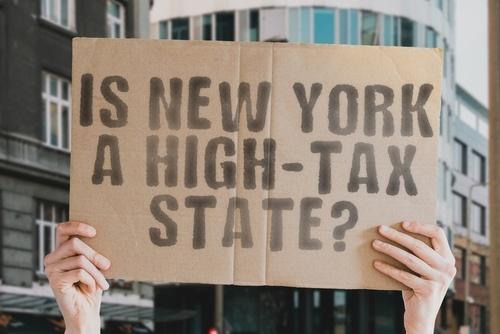In today’s digital world, some people, especially traders, can operate their economic activities while traveling around the U.S. and the world. Some land in one place and change tax domicile, while others continue traveling and never establish a new domicile. The problem is that some states, like New York, continue to subject people to resident taxation until they change their domicile.
Historically, in an inter-state move, a family hired movers to transfer their home contents from one state to another. In that case, their domicile changed on the moving date. It gets more complicated when the family moves their home contents to storage and starts their travels for months or even years.
For example, a family moved out of a New York State home in February 2024 but doesn’t plan to move into their new home in Florida until October 2024. They are spending the interim months traveling around the country and the world. NYS would likely consider this taxpayer a part-year resident until the actual move-in date in Florida in October 2024 and a non-resident of NYS after that date.
The new permanent home requirement with a change of domicile seems unreasonable when the interim months turn into years or never happen. People can move freely without the physical realities of historic domicile rules crafted before the Internet and remote working revolution.
Domicile and tax resident vs. non-resident rules vary by state; most have subjective and objective tests. State tax auditors focus on enforcing residency rules.
New York State domicile rules
NYS subjects domiciled residents with resident taxation on worldwide income reported on Form IT-201. People domiciled in other states but working in NYS file a non-resident Form IT-203 reporting NYS-source income, including wages and business income, but not portfolio income. Telecommuting to a virtual job in an NYS office from an out-of-state domicile is considered NY-source income filed on an NYS non-resident tax return. (there is a “convenience of the employer rule”)
Some assume that moving out of state might be enough to stop owing NYS resident taxes. They are wrong. NYS requires residents to complete a move with a change of domicile, which includes establishing a new permanent home in a new state or country. Some taxpayers don’t achieve these requirements and are stuck in limbo.
See the New York State Department of Taxation and Finance publication 88: General Tax Information for New York State Nonresidents and Part-Year Residents. (Read the domicile rules on pages 5 – 8).
“You can have only one domicile. Your New York domicile does not change until you can demonstrate that you have abandoned it and established a new domicile outside New York State.”
- “A change of domicile must be clear and convincing. Easily controlled factors such as where you vote, where your driver’s license and registration are issued, or where your will is located are not primary factors establishing domicile. To determine whether you have, in fact, changed your domicile, you should compare: ….” (see Pub 88).
There are two exceptions to the NYS domicile rules: the 30-day test for days spent in NYS and the 548-day test for time spent while traveling outside the U.S. The 30-day test requires a new permanent home, whereas the 548-day test for international travel does not.
“Even if your domicile is New York State, you are not a resident if you meet all three conditions in either Group A or Group B as follows:”
The 30-day test: (Group A)
“1. You did not maintain any permanent place of abode in New York State during the tax year; and
- You maintained a permanent place of abode outside New York State during the entire tax year; and
- You spent 30 days or less (a part of a day is a day for this purpose) in New York State during the tax year.”
The 548-day test: (Group B)
“A New York domiciliary can be treated as a nonresident if they:
-Are present in a foreign country or countries for at least 450 days out of a 548-day period.
-Spend 90 days or less in New York during that 548-day period, along with their spouse and minor children.
-During any partial calendar year within the 548-day period, the ratio of days spent in New York vs. the total days in that partial year does not exceed the ratio of the partial year days to 548 days.” (See an example in the NYS law here.)
NYS statutory resident test
- “Generally, if your domicile is not New York State you are considered a New York State nonresident. However, you are a New York State resident for income tax purposes if your domicile is not New York State, but you maintain a permanent place of abode in New York State for more than 11 months of the year and spend 184 days or more (any part of a day is a day for this purpose) in New York State during the tax year.”
New Yorker moves to Florida
These past few years, heightened by the COVID-19 pandemic, many traders and hedge fund employees moved from high-tax states, including New York and Connecticut, to Florida, which does not have an income tax. Others moved from high-tax California to Washington and Texas, which also don’t have an income tax.
Some NYS “snowbirds” are reckless in applying the stringent rules for changing domicile. For example, they might keep their permanent large home in NYS, where they have a closer connection in business and family matters, and buy or rent a small apartment in Florida, barely meeting the 183-day requirement for becoming a Florida resident. If NYS considers that they never changed domicile from NYS to Florida, then its 30-day test applies, not the NYS 183-day statutory residence test.
State domicile rules are complex and involve many subjective factors. Each case can be different, and it’s based on the taxpayer’s intent, facts, and circumstances. Many over-rely on objective formalities like voting and license and underweight subjective factors like family, relative home values, and closer connections.
Relying on antiquated domicile rules crafted before modern technologies and newer ways of living and working is unfair.
Prompt questions for an AI engine:
- What are the rules for a change of domicile in New York State?
- I moved out of NYS to travel and never established a new permanent home. Will NYS tax authorities still consider me domiciled in NYS?
Links:
Star Johnson, CPA, contributed to this blog post.
Read the full article here
















